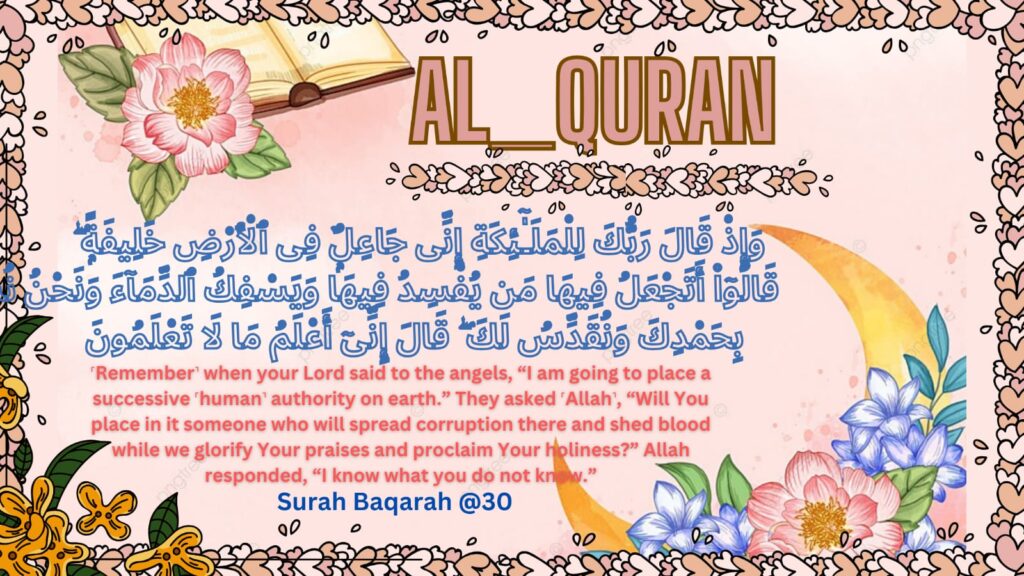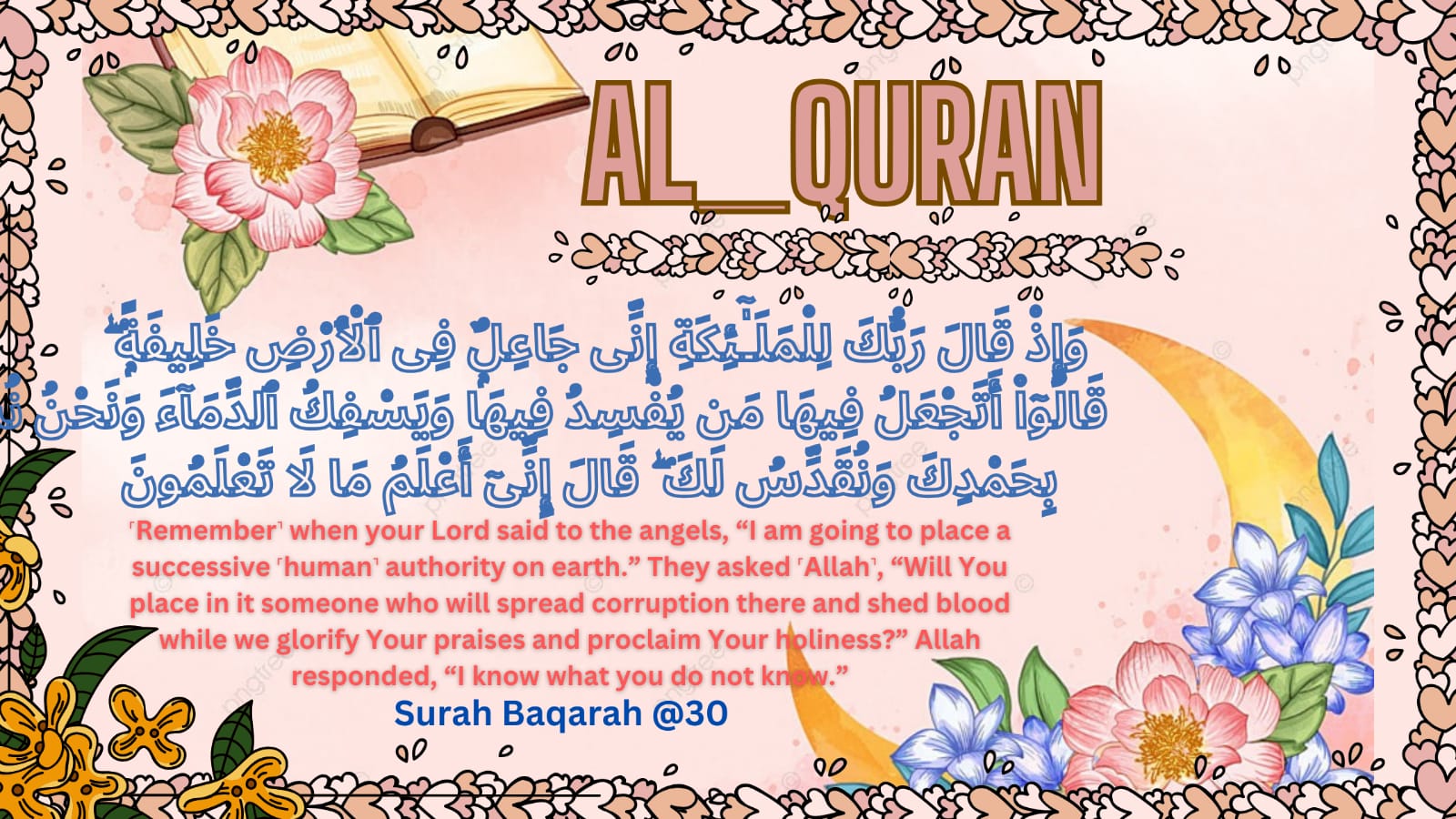
“The Appointment of Adam as God’s Vicegerent “:
This verse plays a significant role in Islamic theology and provides insights into the purpose of human creation. Here’s a detailed explanation of this verse:
The verse, originally in Arabic, reads:
“Behold, your Lord said to the angels: ‘I will create a vicegerent on earth.’ They said: ‘Will You place therein one who will make mischief therein and shed blood, while we celebrate Your praises and glorify Your holy name?’ He said: ‘I know what you know not.'”
- God’s Announcement:
The verse begins with God addressing the angels, announcing His intention to create a vicegerent (khalifah in Arabic) on Earth. This term “khalifah” signifies someone who is entrusted with authority, responsibility, and stewardship.
- The Angels’ Question:
The angels, who are beings created by God from light and are obedient to His commands, express their curiosity and concern. They ask whether God intends to place on Earth a being (Adam) who will engage in corruption and bloodshed. This question reflects the angels’ limited understanding of God’s plan at this point.
- God’s Response:
God responds by saying, “I know what you know not.” This statement emphasizes God’s infinite wisdom and knowledge. It implies that God has a divine plan and purpose for creating humanity as His vicegerent on Earth, and this plan is beyond the comprehension of the angels.
- Humanity’s Purpose:
This verse underscores the idea that God created humans to serve as His representatives on Earth. Humans are given a unique status and responsibility to act as stewards of the Earth.
- Free Will and Accountability:
While the angels expressed concern about humans causing corruption and bloodshed, God’s response implies that humans are endowed with free will and the capacity to make choices, including both good and evil. This free will comes with accountability for their actions.
- God’s Infinite Wisdom:
The verse emphasizes God’s profound knowledge and wisdom. It teaches believers to trust in God’s divine plan, even when they may not fully understand it.
- The Human Condition:
This verse also touches upon the human condition, highlighting our potential for both virtue and vice. It serves as a reminder that humans have the capacity for good deeds and righteousness, but they can also deviate from the right path.
Summery :
In summary, Surah Al-Baqarah, addresses the appointment of Adam as God’s vicegerent on Earth, highlighting the purpose of human creation, the concept of free will, and the importance of trusting in God’s wisdom and plan. It’s a foundational verse in Islamic theology that offers profound insights into the relationship between God, angels, and humanity.
“The Trust Placed Upon Humanity”:
“The Trust Placed Upon Humanity” refers to a profound concept mentioned in Surah Al-Baqarah verse 30 of the Quran. In this verse, God informs us that He appointed humans as vicegerents (khalifah) on Earth, entrusting them with the responsibility to steward and maintain His creation.
This trust implies a profound duty to act as custodians of the Earth, to uphold justice, righteousness, and moral values, and to make responsible choices in their lives. It signifies that humans are not merely inhabitants of this world but are entrusted with a divine mandate to care for it. This concept underscores the importance of ethical conduct, compassion, and environmental stewardship.
It serves as a reminder that humans should strive to fulfill this trust by acting in ways that promote harmony and well-being on Earth, respecting all living beings and the environment, and living a life in accordance with the moral and ethical principles outlined in the Quran.
“God’s Creation and the Responsibility of Humans”:
“God’s Creation and the Responsibility of Humans” is a fundamental theme emphasized in Surah Al-Baqarah verse 30 of the Quran. This verse reminds believers of the profound relationship between God’s creation and human beings. It underscores the idea that the entire universe, with all its intricate systems and diverse life forms, is a divine creation.
In recognizing this, humans are bestowed with a significant responsibility, the trust (amanah), to safeguard and maintain this creation. This responsibility extends beyond mere environmental stewardship; it encompasses ethical conduct, justice, and compassion towards fellow humans.
It serves as a reminder that humans are not disconnected from the world they inhabit but are an integral part of it, and their actions should reflect a sense of responsibility and gratitude towards God’s creation. It encourages a holistic approach to life, where humans strive to protect and nurture the environment, promote justice and kindness, and fulfill their role as stewards of God’s magnificent creation.
“Divine Purpose for Mankind”:
“The Divine Purpose for Mankind” is a profound theme elucidated in Surah Al-Baqarah verse 30 of the Quran. This verse illuminates the belief that human existence is not arbitrary but is imbued with a sacred purpose. According to Islamic teachings, the divine purpose for mankind is to recognize and worship God, the Creator, Sustainer, and the Source of all guidance and wisdom.
In doing so, humans are encouraged to lead a life characterized by righteousness, compassion, and ethical conduct. This divine purpose goes beyond the materialistic pursuits of this world; it encompasses a spiritual dimension where individuals are called to develop a deep connection with God and seek His pleasure.
This purpose provides a moral compass for navigating life’s challenges, emphasizing the importance of humility, gratitude, and the pursuit of justice. It encourages believers to contribute positively to society, to help those in need, and to strive for personal growth and self-improvement. Ultimately, understanding and fulfilling this divine purpose is seen as the key to a meaningful and fulfilling life in the Islamic faith.
“The Covenant with Adam and His Progeny”:
“The Covenant with Adam and His Progeny” is a significant concept highlighted in Surah Al-Baqarah verse 30 of the Quran. According to Islamic teachings, God made a covenant with Adam and his descendants, entrusting them with a special responsibility as stewards of the Earth.
This covenant symbolizes God’s trust in humanity, granting them free will and the capacity to make choices. However, it also carries the moral obligation for humans to obey God’s guidance, live righteously, and uphold justice. It acknowledges the inherent potential for humans to make mistakes but also emphasizes the importance of repentance and seeking God’s forgiveness when they err.
This covenant serves as a reminder that every individual is accountable for their actions and choices, as they are a part of this sacred covenant. It underscores the continuous relationship between God and humanity and the importance of striving to lead a life that aligns with divine guidance and values, ultimately leading to spiritual growth and a harmonious existence on Earth.
Summery :
Certainly! Surah Al-Baqarah, Verse 30, encapsulates the pivotal moment when God declares His intention to appoint Adam and his descendants as His vicegerents on Earth, emphasizing humanity’s unique role in God’s creation. The verse begins with God’s proclamation, followed by the angels’ questioning of whether humans will engage in wrongdoing.
God’s response highlights His supreme wisdom and knowledge, assuring that His divine plan surpasses human and angelic comprehension. This verse underscores the elevated status of humanity, granting them free will and the capacity for both virtue and vice, with accountability for their choices. It serves as a reminder for believers to trust in God’s wisdom and purpose, even when circumstances may seem unclear, offering profound insights into the purpose of human creation and their role as stewards of the Earth.


0 Comments